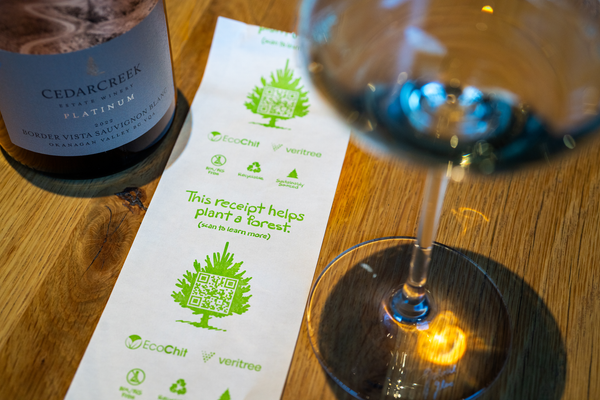Ski Tracks to Store Racks: EcoChit Partners Discuss Business Operation Impacts in the Face of the Climate Crisis.

How will the climate crisis impact the future of your business, and why is it crucial to take action now? We posed this question to three EcoChit partners, aiming to highlight the importance of embedding sustainability practices into everyday business operations.
One thing that these businesses can unanimously agree on is that partnering with EcoChit to plant trees is a simple, practical and impactful solution to help mitigate future risks.
Cedar Creek Winery, part of the Mark Anthony Group, is located in North Okanagan, B.C., an area heavily impacted by forest fires, and it has already experienced the effects of global warming on its business operations. Here’s what they had to say:
“The climate crisis presents a substantial threat to the future of our business as an agricultural business, producing luxury goods. Extreme weather events, such as the unprecedented temperatures and destructive wildfires experienced in recent years in British Columbia, directly impact our vineyards. These events not only jeopardize the overall health and productivity of our vines but also affect the quality and quantity of our wine production. The past two winters, for example, brought extreme cold temperatures that significantly reduced our crops, emphasizing the urgent need for adaptation and mitigation measures.
Lastly, our business, intertwined with local tourism, has felt the impact of climate-related events, with devastating forest fires and associated bans severely impacting hospitality. Given these imminent and escalating challenges, it is crucial for us to act now.”

According to the B.C. Wildfire Service, 2023's wildfire season was one of the most destructive in the province's recorded history, with a staggering 2.84 million hectares of forest and land burned.
“Trees play a crucial role in maintaining biodiversity and supporting ecosystem health, contributing to the overall resilience of our environment. Partnering with EcoChit to plant trees aligns with our values of environmental stewardship and contributes to the larger goal of fostering sustainability within the business community. Ultimately, supporting tree-planting initiatives not only helps our business adapt to climate challenges but also demonstrates a commitment to being part of the solution for a more sustainable future.”
Shifting industries, the ski and snowboard industry heavily depends on cold temperatures for optimal operations and rising temperatures have become a critical concern. We connected with Blue Mountain Resort, part of Alterra Mountain Company, to understand how their operations will be impacted due to a warmer climate.

“Blue Mountain Resort has felt the increasing impact of the climate crisis, witnessing how extreme weather affects our snowmaking operations and regional tourism. The warming temperatures at the start of our winter season required us to stay nimble and adapt quickly, heavily relying on snowmaking and diversifying activities beyond the mountain to keep the magic at Blue alive.
We understand the urgency of our shared climate crisis and meet it with an unwavering commitment to sustainability efforts, engaging in projects that safeguard and preserve our planet's resources. Blue Mountain has always been a haven for people to connect with nature and make lasting memories on our mountain. We are determined to preserve the beauty of the Niagara region and continue offering these experiences for generations to come.
The partnership between Blue Mountain and EcoChit is a match made in eco-heaven. We both understand the urgency of saving our planet and know that businesses hold the key to driving positive change. Through transitioning our Dining, Lodging, Guest Services, and Retail operations over to EcoChit's eco-friendly recyclable receipt paper, we are moving the needle in ensuring Blue Mountain operations are kinder to our environment. Every action matters, and through our resort-wide sustainability initiatives, we can make an impact on mitigating our shared climate crisis and preserving the beauty of Blue Mountain with the help of EcoChit.”

Lastly, we turned our focus to the apparel industry and connected with the team at Patagonia and Elements Outfitters to learn about the challenges the retail industry has been experiencing and to discuss how they are building long-term climate resilience.
“The climate crisis holds profound implications for our business and extends beyond the immediate impacts on our operations. As purveyors of outdoor apparel, particularly ski and snow gear, the current warmer winters have already presented challenges for Elements Outfitters/Patagonia Calgary, Banff and Victoria. However, our commitment to addressing the climate crisis is not solely motivated by its effects on our business.
Beyond the bottom line, we are driven by a deep dedication to the environment. Our mission extends beyond providing customers with top-tier outdoor gear; it encompasses a responsibility to preserve and protect the very landscapes our products are designed for. In acknowledging the interconnectedness of our actions and the environment, we have taken deliberate steps to align our business practices with sustainable and eco-friendly choices.
As proud members of 1% for the Planet, we contribute to initiatives that directly support environmental causes. Our commitment is further evidenced in our choice of EcoChit receipt paper, a fellow 1% for the Planet Member, emphasizing our dedication to reducing our ecological footprint. In recognizing the urgent need to act, we believe that businesses, large and small, play a crucial role in fostering a sustainable future.
By prioritizing eco-conscious choices and contributing to environmental causes, we hope to inspire positive change within our industry and beyond. Our response to the climate crisis is not just a business imperative; it is a shared responsibility towards safeguarding the health and longevity of our planet.”

In conclusion, our discussions illuminated the urgency for organizations across all sectors to embed sustainability into their business models in order to adapt and mitigate the impacts of global warming.




